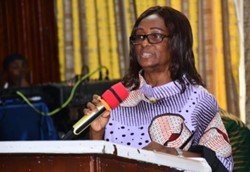The ongoing conflict at Liberia’s National Elections Commission (NEC) has intensified, sparked by a disagreement over the management of leftover funds amounting to US$8 million from a total budget of US$53 million allocated for the 2023 Presidential and Representative Elections. This discord, primarily between Chairperson Davidetta Browne-Lassanah and Co-Chair Commissioner P. Teplah Reeves, has raised important questions regarding the financial governance within the NEC, the transparency of its operations, and the implications these issues may have on the Commission’s credibility as Liberia looks ahead to the upcoming elections in 2029. The struggle for authority over how the remaining funds should be allocated and declared represents deeper systemic challenges within the NEC, questions lingering after an election that, notwithstanding the tension, was acknowledged as generally free and credible, with the incumbent conceding defeat beforehand.
The conflict’s core revolves around Chairperson Browne-Lassanah’s assertion that the US$8 million has been duly declared to the Government of Liberia, complying with the established Public Financial Management (PFM) laws following the recent elections. On the other hand, Co-Chair Reeves has reportedly contested this declaration, preferring to use the unallocated funds to address immediate operational concerns within the NEC. This difference in approach has not just unveiled debates on fund management but also illuminated governance struggles relating to the overall operational integrity of the Commission. The public’s scrutiny has intensified, as citizens wonder how effectively the NEC can perform its duties under the shadow of such discord, particularly in light of their role in maintaining democratic processes in the country.
In broader terms, the communication gap between Browne-Lassanah and Reeves is indicative of the underlying discord impacting the NEC’s functionality. Browne-Lassanah claims that after initial claims about the remaining funds, she sought guidance from current Finance Minister Augustine Kpehe Ngafuan and that the financial moves had been approved by earlier finance administration. Meanwhile, the internal dynamics forebode complications as nearly US$2 million was additionally spent on bye-elections in Nimba and Grand Gedeh, further reducing the balance to about US$5 million. Despite these expenditures and the NEC’s movements towards submitting a supplementary budget of US$2 million, uncertainties linger as to how effectively the Commission can navigate its financial constraints while addressing critical operational necessities.
Chairperson Browne-Lassanah’s frustrations deepen as she expresses concerns over being undermined within her position, citing internal discord and claiming that her role is often reduced to that of a spokesperson rather than an authoritative figure. In contrast, Co-Chair Reeves has denied having discussions about the declaration of the remaining funds, stressing instead how procedural interpretations rather than personal grievances are at the crux of their disagreements. Reeves’s assertion highlights a point of contention that deviates from personal animosity toward a clash over organizational roles and operational authority. This discourse suggests a need for a more cohesive framework regarding governance and communication within the NEC, emphasizing the importance of collaboration and clarity in their collective functions.
The legal interpretation of the Public Financial Management law further complicates the situation, as Reeves contends that the regulations stipulate that any leftover funds must revert to the government unless explicit permission is granted for their reallocation to the NEC. Her claims emphasize the need for a clear and collective decision-making strategy at the Commission, which she perceives as lacking amid the current tension. The disagreement over the remaining funds has led to supporting staff members expressing dissatisfaction through protests, drawing attention to the working environment within the NEC and underscoring the potential ramifications of this internal strife.
In conclusion, the ongoing clash over the management of leftover finances within the NEC encapsulates essential governance challenges in Liberia’s elections oversight body. As Chairperson Browne-Lassanah and Co-Chair Reeves navigate their stances, the situation underscores the potential impact of administrative misalignment on the Commission’s credibility and the electoral process at large. Greater transparency, collaboration, and adherence to procedural law are paramount for restoring confidence in the NEC’s operation. Looking forward, Liberia’s democratic process may hinge upon the resolution of these conflicts and the establishment of clearer guidelines for governance within the NEC to ensure effective election management well into the future.














